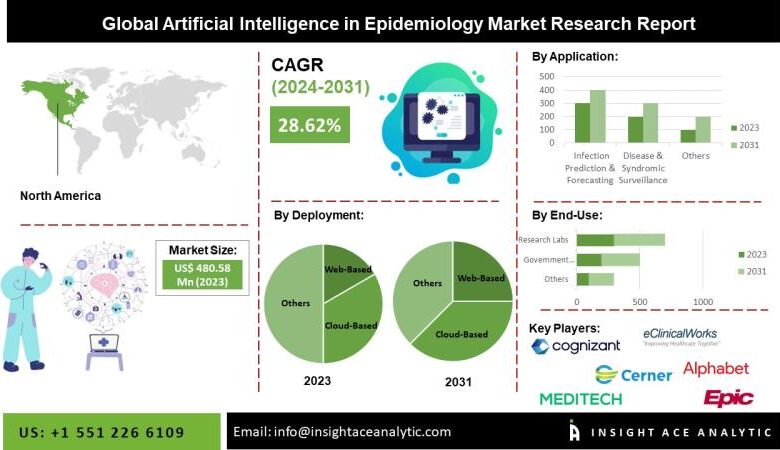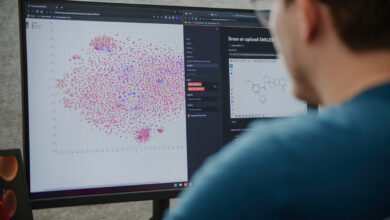Artificial Intelligence in Epidemiology Market: A Catalyst

According to a new report by InsightAce Analytic, the “Artificial Intelligence in Epidermiology market” in terms of revenue was estimated to be worth $380.58 Mn in 2023 and is poised to reach $3,496.1 Mn by 2031, growing at a CAGR of 28.62% from 2024 to 2031.
Request for Sample Pages: https://www.insightaceanalytic.com/request-sample/1450
Latest Drivers Restraint and Opportunities Market Snapshot:
Key factors influencing global artificial intelligence in the epidemiology market are:
• Big data handling
• Early detection and surveillance
• Predictive modeling
The following are the primary obstacles to artificial intelligence in the epidemiology market’s expansion:
• Data quality and bias
• Ethical concern
• Dynamic nature of the disease
Future expansion opportunities for the global artificial intelligence in epidemiology market include:
• Earl’s detection of disease outbreaks
• Precision epidemiology
• Integration with the healthcare system
Market Analysis:
The utilization of artificial intelligence in the surveillance of real-time health data, encompassing electronic health records, social media, and online queries, can facilitate the detection and tracking of disease outbreaks. This may offer opportune awareness of potential health hazards. Predictive models based on artificial intelligence analyze diverse data sources and forecast disease prevalence using machine learning algorithms. These models aid policymakers and health officials in the development and execution of targeted interventions. As a consequence, the market expanded.
List of Prominent Players in the Artificial Intelligence in Epidemiology Market:
• IBM Corporation
• Google Health
• Microsoft Healthcare
• Palantir tech
• Kinsa health
• Bluedot
• Amazon web service
• IQVIA
• SAS institute
• Oracle health science
• Epidemic
• Health map
Curious about this latest version of the report? @ https://www.insightaceanalytic.com/enquiry-before-buying/1450
Recent Developments:
• September 13, 2022: The National Institutes of Health (NIH) has begun investing $130 million over four years to accelerate the adoption of artificial intelligence (AI) in science and behavioral research.
• August 30, 2022: Penn Medicine and The Children’s Hospital of Philadelphia (CHOP) have established the Penn-CHOP Kidney Innovation Center to fund research aimed at improving patient care for both adults and adolescents with kidney injury.
• November 7, 2022: The University at Albany has announced plans to hire a record 27 new faculty members focused on artificial intelligence, kicking off the university’s ambitions to integrate AI training and development across all departments.
Artificial Intelligence in Epidemiology Market Dynamics:
Market Drivers: Data Processing And Analysis
Artificial intelligence enables us to efficiently process and analyze large and complex data sets, including electronic health records, genomic data, and social determinants of health. This skill is essential for epidemiologists to discover patterns, trends, and relationships. Artificial intelligence will facilitate real-time monitoring of health data, allowing epidemiologists to detect and respond to disease outbreaks more quickly. This is particularly important for infectious diseases, where early detection can lead to effective containment measures.
Machine learning algorithms based on artificial intelligence can help epidemiologists develop disease spread prediction models that can predict and plan for potential outbreaks. These models can take into account a variety of factors, including population movements and environmental conditions.
Challenges: Data Quality And Bias
AI models rely heavily on the quality and representativeness of the data used for training. Incomplete or biased data sets can cause models to not generalize well to various populations, leading to biased predictions. Many AI algorithms, especially deep learning models, are considered “black box” systems, making it difficult to understand how they reach specific conclusions. Lack of clarity can reduce the acceptance and reliability of AI-based epidemiological predictions. AI in epidemiology often involves the analysis of large data sets, raising concerns about patient privacy. Ensuring ethical data processing practices and compliance with privacy regulations is important but can be difficult.
North America Is Expected To Grow With The Highest CAGR During The Forecast Period
The use of artificial intelligence (AI) in epidemiology in North America has been impressive, with several initiatives, collaborations, and research efforts focused on using AI technology for public health. North America, particularly the United States and Canada, is home to many leading research institutions and universities in AI and epidemiology research. These labs collaborate on projects to develop artificial intelligence-based tools for disease surveillance, outbreak prediction, and data analysis. Healthcare in North America is increasingly using AI technologies for a variety of applications, including epidemiology. Hospitals, health systems, and research institutions in the region are exploring how AI can improve disease detection, diagnosis, and treatment planning. North American public health agencies such as the US Centers for Disease Control and Prevention (CDC) and the Public Health Agency of Canada are actively participating in the use of AI for disease surveillance and response. This agency plays an important role in monitoring and controlling the spread of infectious diseases. Several North American technology companies and startups are actively contributing to the development of AI tools for epidemiology. This includes integrating artificial intelligence into health analytics platforms, wearables and other solutions that support healthcare efforts.
Segmentation of Artificial Intelligence in Epidemiology Market-
By Deployment
• Cloud-based
• Web-based
By Application
• Infection Prediction and Forecasting
• Disease and Syndromic Surveillance
By End-user
• Government and State Agencies
• Research Labs
• Pharmaceutical and Biotechnology Companies
• Healthcare Providers
By Region-
North America-
• The US
• Canada
• Mexico
Europe-
• Germany
• The UK
• France
• Italy
• Spain
• Rest of Europe
Asia-Pacific-
• China
• Japan
• India
• South Korea
• Southeast Asia
• Rest of Asia Pacific
Latin America-
• Brazil
• Argentina
• Rest of Latin America
Middle East & Africa-
• GCC Countries
• South Africa
• Rest of Middle East and Africa
For More Customization @ https://www.insightaceanalytic.com/customisation/1450
InsightAce Analytic Pvt. Ltd.
Tel.: +1 551 226 6109
Email: info@insightaceanalytic.com
Site Visit: www.insightaceanalytic.com
Follow Us on LinkedIn @ bit.ly/2tBXsgS
InsightAce Analytic is a market research and consulting firm that enables clients to make strategic decisions. Our qualitative and quantitative market intelligence solutions inform the need for market and competitive intelligence to expand businesses. We help clients gain competitive advantage by identifying untapped markets, exploring new and competing technologies, segmenting potential markets and repositioning products. Our expertise is in providing syndicated and custom market intelligence reports with an in-depth analysis with key market insights in a timely and cost-effective manner.
This release was published on openPR.



